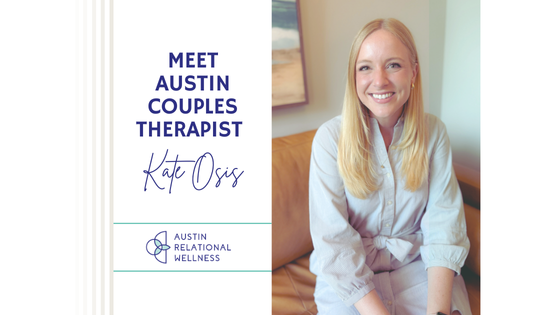At Austin Relational Wellness, we’re proud to introduce Justine Hughes, one of our therapists dedicated to helping people cultivate stronger relationships and more meaningful lives. Justine works with both couples and individuals, creating a space where vulnerability, curiosity, and compassion open the door to connection and growth. Her work is rooted in the belief that relationships, with others and with ourselves, are powerful places for healing and transformation.
My Approach in the Therapy Room
I’m a therapist who works with both couples and individuals who are longing for deeper, more fulfilling relationships and lives. Over the years, I’ve had the privilege of sitting with people in many different seasons—when relationships feel conflict-ridden, when the spark seems to have faded, or when life has brought unexpected losses that shake the ground beneath them. My training is rooted in attachment-informed, psychodynamic, and experiential approaches, which means I pay close attention to emotions in the moment, look at relational patterns, and gently explore the unconscious ways our past might be shaping the present. I see therapy as a collaborative process where we identify the underlying sources of pain and move together toward growth, empowerment, and connection.
Why I Chose to Become a Therapist
I chose this work because I deeply believe in the power of relationships and that my natural gifts lie in connecting with others. So often, the places where we struggle the most are also where we long to feel safe, understood, and loved. Becoming a therapist felt like a natural path for me and the best use of my curiosity in others. I wanted to hold space for people when life feels overwhelming, confusing, or lonely. I know how transformative it can be when someone feels truly seen and supported, and I wanted to be that presence for others, just as my own therapists have been for me. I feel my experience first and foremost as a client of therapy provides me with both deeper insight and immense confidence in the power of this work.
What I’m Passionate About in Therapy
What lights me up in the therapy room is witnessing people rediscover themselves and their connections. I love when a couple finds a new way to communicate that opens the door to intimacy, or when an individual begins to feel empowered in their own voice. Those moments of realization and reconnection, when clients can feel both safe and brave, are what I’m most passionate about. My role is to help tend to the tender places with compassion, so clients can move toward relationships and lives that feel more whole and alive.
Beyond the Therapy Space
Outside of therapy, I try to practice what I preach about connection and presence. Though sometimes that looks like deep conversations with friends, and other times it’s me binge-watching a new show, downing a burger. I love being outdoors, exploring new places, and laughing a lot (usually at my own jokes). I also find a lot of joy in slowing down, whether that’s with a good meal, a long walk, or simply doing nothing at all. Life can get heavy, so I make it a point to soak up the lighthearted, silly moments wherever I can and really enjoy my people!
If you’re ready to take the next step toward healthier, more connected relationships, Justine is here to walk alongside you. Whether through couples therapy to rebuild intimacy or individual therapy to rediscover your own voice, she offers a supportive and empowering space for growth. Reach out to Austin Relational Wellness today to schedule with Justine Hughes and begin your path toward deeper connection and lasting change.
Justine Hughes, MA, LMFT Associate
Offering Couples Therapy and Individual Therapy in Austin, TX and Online to Texas residents!







































































